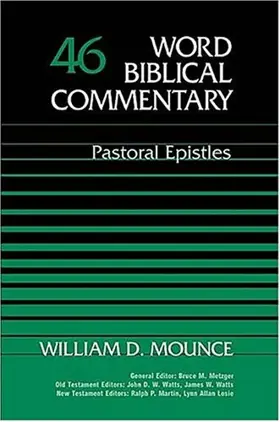

Pastoral Epistles
Pages
592
Publisher
Thomas Nelson
Published
1/1/2000
ISBN-13
9780849902451
Collections
This book appears in the following featured collections.
- John Piper's NT Commentary Recommendations by John Piper (Desiring God)
- Favorite Advanced NT Commentaries by Jeremy Pierce (parableman)
- First Commentary Set by Brian LeStourgeon
- Recommended NT Commentaries by Denver Seminary Journal
- D. A. Carson's Commentary "Best Buys" by D. A. Carson
- Ultimate Commentary Collection: NT Technical by John Glynn
- Essential Pauline Commentaries by Marcus Maher
- New Testament Advanced Commentaries by Moore Theological College Journal: Societas
- Basic Library Booklist by Detroit Baptist Theological Seminary
- Cambridge Chinese Christian: Recommended Commentaries by Calvin Cheah
- Building an NT Commentary Library by Invitation to Biblical Interpretation (Kostenberger & Patterson)
- The Pastor’s Bookshelf by Scot McKnight
- Recommended New Testament Commentaries for Evangelical Pastors by Thomas R. Schreiner
- TGC: Scholarly Commentaries by The Gospel Coalition
Reviews
As a pastor and preacher of a small local church I found this to be a thorough and fairly readable commentary with a lot of technical depth. And I could access it even though my ability in the Greek is quite rudimentary (though those better trained in sure would get more out of it).
Mounce defends Pauline authorship unapologetically but with detailed review of criticisms, which is his standard approach. He surveys a diversity of scholarly positions whilst also presenting his own persuasion. He sometimes could be clearer in his own assessment of the various arguments, but on the whole very helpful.
My main use for this commentary was to explore grammar and vocabulary details for more complicated verses and to see the breath of positions in some more difficult passages.
Pastors and students reading the Greek text of Paul’s letters to Timothy and Titus will want to have Mounce’s commentary at the ready. It blends rigorous scholarship, conservative and complementarian theological convictions, and pastoral sensibilities. While Mounce’s comments are detailed and thorough, his explanation sections helpfully synthesize and apply the text’s message in a way that is accessible to readers regardless of their knowledge of Greek.
[Full Review]
Goes into great detail, but doesn't get bogged down. Best I've encountered on the Pastoral letters.
My preferred first choice on the pastorals.
The experts all recommend this one. Keith Mathison writes, “Many will recognize William D. Mounce as the author of the widely used Basics of Biblical Greek Grammar. His commentary on the Pastoral Epistles in the Word series is very helpful. Mounce thoroughly discusses all of the important issues raised by Paul (whom he believes wrote these epistles), and when dealing with controversial parts of the letters, he fairly represents those with whom he disagrees. All in all, a very good commentary.”
[Full Review]
While he is better known for his ubiquitous Greek Grammar, Mounce has produced a fine commentary on the Pastoral Epistles. His introduction is very well written and is a good overview of the methodological issues which stand behind the problem of authorship. Mounce settles on a form of amanuensis theory to explain the differences between the Pastorals and the other letters of Paul. He includes an excursus on Pseudepigraphy and Canon which is one of the better overviews of the problem I have read. (The introduction is 136 pages; I wish that the Word series would dispense with Roman numerals for introductions when they run this long!) The body of the commentary follows the pattern of the Word series: Bibliography, followed by a fresh translation with textual notes, form/structure, formal commentary and explanation. The Formal commentary is on the Greek text without transliteration, and like the rest of the series, there are no footnotes, all sources are cited in-text. As might be expected, Mounce’s comments on the syntax of the Greek are detailed, but he does not merely identify forms, he consistently draws out theological conclusions based on his exegesis.
[Full Review]
Great commentary. Probably the most thorough of all on the pastorals. Horrible layout as it is in the out dated Word series. But the info inside is intense, just the way I like it.
Many will recognize William D. Mounce as the author of the widely used Basics of Biblical Greek Grammar. His commentary on the Pastoral Epistles in the Word series is very helpful. Mounce thoroughly discusses all of the important issues raised by Paul (whom he believes wrote these epistles), and when dealing with controversial parts of the letters, he fairly represents those with whom he disagrees. All in all, a very good commentary.
[Full Review]
An excellent conservative exposition. Pauline authorship, complementarian. Clear, cogent, constructive.
Mounce is a stinking genius!












